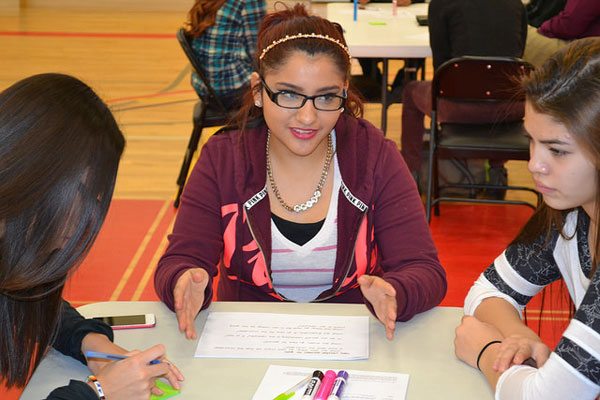
December 7, 2017; Scientific American
Noshene Ranjbar, a child and adolescent psychiatrist, has worked “closely with the Lakota community on the Pine Ridge and Rosebud Indian Reservations, as well as with young people from several Arizona tribes including the Tohono O’odham, Pascua Yaqui, and Navajo communities.”
In an op-ed in Scientific American, Ranjbar notes that when racial slurs are uttered by political leaders, as when President Trump sought to demean Sen. Elizabeth Warren by calling her “Pocahontas,” it provokes “further emotional and psychological trauma for a people that have already been persecuted and marginalized by the government for generations.”
Ranjbar adds:
Historical and intergenerational trauma, rooted in the genocide and cultural genocide that went on for decades, continues to impact the individuals, families and communities who survived.… Life experiences can change the health of individuals and these changes can also impact the health of their descendants. Sustained high levels of stress are known to contribute to such patterns, and research has demonstrated biological changes in the offspring of trauma survivors in populations ranging from Holocaust survivors, to individuals directly impacted by the 9/11 attacks, to American Indian populations.
But, Ranjbar remarks, “these changes are reversible when people experience positive, nurturing, and correcting life experiences.”
Sign up for our free newsletters
Subscribe to NPQ's newsletters to have our top stories delivered directly to your inbox.
By signing up, you agree to our privacy policy and terms of use, and to receive messages from NPQ and our partners.
In particular, Ranjbar highlights a program that, over the past seven years, has been developed by a team from the Center for Mind-Body Medicine. “This model,” Ranjar says, “based on self-care skills training in small groups, involves training American Indian teachers, counselors, healthcare providers, and community leaders in the science and practice of mind-body medicine techniques to better care for themselves. It also teaches them how to facilitate small groups using this model for children, teens and adults in the community. The techniques include meditation, guided imagery, biofeedback, emotional expression through the use of writing and drawings, mindful eating and nutrition, and movement.”
Ranjbar explains that the model helps heal trauma by bridging “the gap between indigenous practices that promoted mind-body-spirit connection with the emerging science of trauma recovery and resiliency. The skills help build a toolkit to promote better self-care, self-awareness and empowerment, and the small groups allow for a sense of safety, connection and mutual support for the participants and facilitators alike.”
Funding for this work, Ranjbar indicates, has come from a number of foundations, including Battery Powered, Swift Foundation, Windrose Fund, Mimi Fund, FISH Foundation, Open Road, and the George Family Foundation.
Ranjbar points to the Little Wound School as an exemplar of this approach of trauma intervention. The Little Wound School, a K-12 school on the Pine Ridge Reservation in South Dakota, won a “three-year Administration for Native Americans grant for a first large-scale program of training professionals working with youth in schools to incorporate this work into the school curriculum for thousands of students in seven tribal schools on the reservation.”
“In these trainings,” Ranjbar says, “I have heard the stories of children and teens who find a safe space to share and process their grief, fears, and anger, some for the very first time. I hear their dreams to help their relatives to heal and rise above pervasive struggles.… Perhaps most profoundly, I hear the younger generation being able to reconcile modern science with wisdom of their ancestors and cultural practices that promoted resiliency to their people for thousands of years.”
But programs alone are not enough, Ranjbar says, to heal the trauma. Instead, Ranjbar calls on the US president to issue a formal apology, as the prime ministers of Canada and Australia did years ago.
“What is needed,” Ranjibar emphasizes, is “to have the culture, heritage and ways of life of American Indians honored…in addition to reconciliation, and acknowledgement of the reality of historical trauma and the oppression from colonialism.”—Steve Dubb













